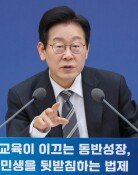[Editorial] A Republic of Committees That Interferes With State Affairs Needs Adjustment
[Editorial] A Republic of Committees That Interferes With State Affairs Needs Adjustment
Posted May. 28, 2005 03:25,
The biggest question mark of the Haengdam Island development project is why the Presidential Committee on the Northeast Asian Cooperation Initiative intervened. The committee is an advisory one. Still, it gave Haengdam-do Development Corp. a letter of intent (a letter of recommendation) that promised the governments support in order to help the company issue bonds overseas. The committee signed even a memorandum of understanding (MOU) to promote business cooperation.
The executive order under which the committee operates includes authorization for deliberation (Article Two) and requests for cooperation (Article 12). However, articles that allow decision making or execution are found nowhere. Yet, the advisory committee exceeded its authority by encroaching upon the execution of policy allowed, such as attracting investment. In the process, other relevant governmental agencies were ignored and excluded.
Though Committee Chairman Moon Jeong-in has resigned, the issue of going beyond ones powers is also the case with other presidential advisory committees. Excluding constitutionally independent committees, there are 23 committees under the president, and 19 of them are advisory ones such as the Committee on Balanced National Development and the Committee on Government Innovation and Decentralization. Four of them are administrative ones, including the Regulatory Reform Committee and the Korea Independent Commission Against Corruption. At the end of the previous administration, the number of presidential committees and commissions was 18. Afterwards, five were disbanded and 10 were newly created.
At issue is that most new advisory committees or commissions have been established by presidential orders. The fact that they are not based on the law makes it more likely for the president to manage the committees arbitrarily without consultation. For their part, the committees could well abuse their authority with the presidents backing.
Many point out that every sort of presidential committee or commission has put their nose deep into national policy making as if they were part of the cabinet, and consequently caused a stir among ministries. Relocation of administrative capital and a series of real estate policies came from some of those presidential committees. Last year, the Constitutional Court ruled against the relocation, and real estate policies led to resistance from the public.
One can agree that presidents need committees to receive assistance to form mid- and long-term policies. But the need should be moderate. If there are so many committees that the public makes mention of a republic of committees, the harm the committees do outweighs the need for them.
The number of people, who belonged to advisory committees to the president substantially increased from about 300 at the end of former President Kim Dae-jungs tenure to about 500. In addition, the annual budget amounted to 70 to 80 billion won.
Many of the members on committees have been appointed on grounds that they get along with the president. Therefore, there has been criticism that some of the committee members are professional ideologues and amateur administrators who lack necessary expertise or experience. In fact, the committees and commissions have been set up to listen to a variety of people. If they tend to listen to or to include into policies only what certain groups of society reveal, problems will arise.
Despite these dangers and concerns, there is no medium of checks and balances to control those committees. At the request of the National Assembly, this spring, the Board of Audit and Inspection did carry out special investigations into the operation and the budgets of committees. However, inspectors have missed the points that matter: Why do that many committees exist? Is number of committee members optimal? Is everyone fully qualified? Are the budgets reasonably allotted and spent? Therefore, the special inspections were superficial.
Public servants have grievances against presidential committees. Important policies called roadmaps are shaped by these committees. But if the policies do not work out, it is the ministries that come under fire. That is why some grumble, saying, All the offices around the Central Government Complex and the Cheong Wa Dae are occupied by the committees. They can take care of everything. What is the need for public servants in ministries?
Others complain that the Cheong Wa Dae purposefully ignores the call for the closure of some committees by ministries, scholars and opposition parties. Late last year, President Roh Moo-hyun said, It is not wrong to dub Korea a republic of committees. But to strike down the barriers between ministries and to coordinate policies, we do need committees. One wonders how many Koreans would agree that the committees have contributed to advance the interest of the nation and the public by satisfactorily integrating policies.
In the U.S., the law that governs federal advisory councils stipulates that an advisory council can be created only when there is a consensus on the necessity. The authority of the council is strictly confined to giving advice. Councils are banned from overriding their stated powers to involve in other activities.
Chairman Moons resignation alone does not make the abuse of powers by presidential committees go away. It is a correct course of action to close, reduce or consolidate unnecessary committees, following the rule of choice and concentration. Instead, cabinet members should be given enough authority so that they can adhere to their own convictions and principles. This is the manifestation of decentralization, a point the president has been arguing for. If the committee system in place is not corrected, another scandal like the Haengdam Island scandal will not be unlikely.




![10번 북송된 그녀, 73만 유튜버 되다…탈북 유튜브 ‘유미카’ 뒷이야기[주성하의 북에서 온 이웃]](https://dimg.donga.com/c/138/175/90/1/wps/NEWS/IMAGE/2025/12/12/132938957.1.jpg)


